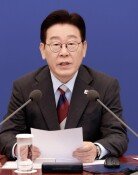Living as a Lawmakers Husband
Bong-suk, eat a lot, please.
Here, Bong-suk is Sohn Bong-suk (61, lawmaker from the Millennium Democratic Partys proportional representation). Her husband, Ahn Cheong-si (61), a politics professor at Seoul National University, usually speaks to his wife in this manner. They are famous for their conjugal affections in Lawmaker Hall of the National Assembly. When they have a meal with her aides, Mr. Ahn even puts some side dishes on his wifes spoon.
When Mr. Ahn comes back home late due to his congregate dining, calling her aides, he requests earnestly, Could you have supper with her and then see her home? Please, have her eat a delicious meal. In addition, when Mr. Ahn broke down from overworking a few years ago, they even slept while hugging each other in a cramped single bed in his sickroom.
A few days ago, Grand National Party (GNP) lawmaker Lee Hye-hoon (representing Seocho-gap, Seoul)s husband, Kim Young-se (economics professor at Yonsei University)s cell phone rang during his lecture. The person who called him was his eldest son who is a second-year student in middle school. After completing his lecture, he called his eldest son back. His eldest son said, Father, my teacher asked you to come to school. So Mr. Kim called his wife, Rep. Lee, but he heard from her attending secretary that she is in a meeting.
After his wife became a lawmaker, their role allotment in which mother and father are in charge of their childrens school and private educational institutions affairs, respectively has totally collapsed. As he pays all of his attention to his sons school affairs in place of his wife, it is natural to neglect his sons private educational institutions affairs.
Rep. Kim Young-joo (from the Uri Partys proportional representation)s husband, Min Geung-gi (52, Korean language and literature professor at Changwon National University) is still clumsy at acting as a lawmakers husband.
Rep. Kim recently opened an office in order to run for the regional constituency of Yeongdeungpo-gap, Seoul. Mr. Min, who is not good at sports, decided to be a member of soccer group that usually plays early in the morning after seeing a poster in front of his apartment. His decision was for the sake of his wife. However, he heard complaints from his wife immediately. His wife said, Why did you become a member of soccer group that usually plays early in the morning, and added, If you are to be a member, your bones may be broken.
He also received a scolding from his wife because he became angry when he returned clothes that were laundered late. His wife said, Do you know how large the effect your words to laundrymen mouth are, and if you know it, be good to them and smile.
Of course, the impregnability of a traditional husband type still remains. Uri Party Rep. Lee Eun-youngs husband, Park Jin-do, an economics professor at Chungnam National University (53) belongs to this type. He, who is an eldest grandson, regards fraternity highly among his family and is strict. Rep. Lee has to come back home by 10:00 p.m. In other words, 10:00 p.m. is her curfew. Rep. Lee, who is the eldest daughter-in-law, has prepared food for her husbands familys ancestral rites. She has done both taking charge of her family and carrying out parliamentary affairs well.
There are 39 women lawmakers in the 17th National Assembly. Among them, the number of married women lawmakers is 28. In a male-focused society and women-focused families, they currently belong to a minority group. However, among lawmakers with husbands or lawmakers husbands, there is one common: that is that husband and wife are always together, and they do three-legged race.
Young-Chan Yoon Jung-Eun Lee yyc11@donga.com lightee@donga.com



![아침 공복 따뜻한 물 한 잔, 정말 살 빠지고 해독될까?[건강팩트체크]](https://dimg.donga.com/c/138/175/90/1/wps/NEWS/IMAGE/2026/03/05/133467930.3.jpg)



